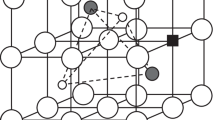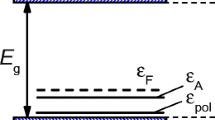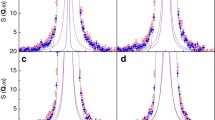Abstract
The influence of interaction of protons with defects (acceptor impurities, oxygen vacancies) and with each other on the proton transfer in acceptor-doped proton-conducting oxides A II B IV1−x R III x O3 − δ with the perovskite structure and in oxides A III2−x R II x O3 − δ with the structure of a distorted fluorite (bixbyite) has been investigated theoretically. The tracer diffusion coefficient D* and proton mobility have been calculated by the Monte Carlo method and analytically. It has been shown that the interaction of protons with defects substantially affects the magnitude and behavior of the transfer coefficients. The interaction with acceptor impurities plays the most important role. The proton mobility significantly decreases even at a low dopant concentration (x ∼ 1–3 at %). The dependence of the proton conductivity σ on the impurity concentration can exhibit maxima. For oxides with the bixbyite structure including nonequivalent cation sites, the distribution of the dopant over these sites has a strong influence on the dependence σ(x). The obtained results have been used to interpret the experimental data on the proton conductivity for a number of oxides.
Similar content being viewed by others
References
H. Iwahara, Solid State Ionics 125, 271 (1999).
K. D. Kreuer, Annu. Rev. Mater. Res. 33, 333 (2003).
T. Schober, Solid State Ionics 162–163, 277 (2003).
Y. Larring, T. Norby, and P. Kofstad, Solid State Ionics 49, 73 (1991).
M. E. Björketun, P. G. Sundell, and G. Wahnström, Phys. Rev. B: Condens. Matter 76, 094301 (2007).
T. Yajima, H. Suzuki, T. Yogo, and H. Iwahara, Solid State Ionics 51, 101 (1992).
J. A. Kilner, Solid State Ionics 129, 13 (2000).
R. Hempelmann, M. Soetratmo, O. Hartmann, and R. Wappling, Solid State Ionics 107, 269 (1998).
C. Karmonik, T. J. Udovic, R. L. Paul, J. J. Rush, K. Lind, and R. Hempelmann, Solid State Ionics 109, 207 (1998).
M. E. Björketun, P. G. Sundell, G. Wahnström, and D. Engberg, Solid State Ionics 176, 3035 (2005).
M. S. Islam, J. Mater. Chem. 10, 1027 (2000).
L. P. Putilov, A. N. Varaksin, and V. I. Tsidilkovski, J. Phys. Chem. Solids 72, 1090 (2011).
S. Matsuo, H. Yugami, and M. Ishigame, Phys. Rev. B: Condens. Matter 64, 024302 (2001).
V. I. Tsidilkovski, M. Z. Uritsky, A. N. Varaksin, and A. Ya. Fishman, Diffus. Defect Data, Pt. A 258–260, 124 (2006).
A. A. Smirnov, Theory of Diffusion in Interstitial Alloys (Naukova Dumka, Kiev, 1982), pp. 92–141 [in Russian].
V. I. Tsidilkovski, Solid State Ionics 162–163, 47 (2003).
V. I. Tsidilkovski, V. B. Vykhodets, T. E. Kurennykh, V. P. Gorelov, and V. B. Balakireva, JETP Lett. 92(11), 774 (2010)
M. Z. Uritsky and V. I. Tsidilkovski, Phys. Solid State 45(6), 1005 (2003).
V. P. Gorelov, V. B. Balakirev, Yu. M. Baikov, and E. K. Shalkova, Russ. J. Electrochem. 33(1), 42 (1997).
T. Schober, F. Krug, and W. Schilling, Solid State Ionics 97, 369 (1997).
Author information
Authors and Affiliations
Corresponding author
Additional information
Original Russian Text © M.Z. Uritsky, V.I. Tsidilkovski, 2014, published in Fizika Tverdogo Tela, 2014, Vol. 56, No. 11, pp. 2104–2110.
Rights and permissions
About this article
Cite this article
Uritsky, M.Z., Tsidilkovski, V.I. Role of an acceptor impurity in the proton transfer in proton-conducting oxides. Phys. Solid State 56, 2173–2180 (2014). https://doi.org/10.1134/S1063783414110298
Received:
Published:
Issue Date:
DOI: https://doi.org/10.1134/S1063783414110298




